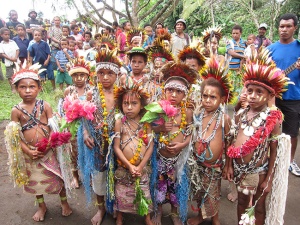 A proactive team from James Cook University is currently working in Papua New Guinea to develop an eco-tourism industry around the Papuan Black Bass, one of the world's toughest sportsfish.
A proactive team from James Cook University is currently working in Papua New Guinea to develop an eco-tourism industry around the Papuan Black Bass, one of the world's toughest sportsfish.
Healthy oceans, rivers and streams are crucial for life, the provision of food and good economic development, particularly if you happen to be a small developing economy like Papua New Guinea.
Papua New Guinea is a very culturally and geographically diverse country of close to seven million people with over 40 percent of them living a self-sustainable natural lifestyle with no access to global capital. Enter the team of researchers from James Cook University with a most unusual plan that just might work.
The Papuan black bass, Lutjanus goldiei, is also recognized as the Niugini bass, pargo de Papua, vivaneau de Papua, and ikan merah. It is found in a small area that includes southern Papua New Guinea from the Port Moresby district to the Fly River.
The fish is actually a member of the snapper family of fish and is considered the world's toughest yet least-known freshwater fishes. This fish, resembling a cross between a grey snapper and a large-mouth bass can be found in large, snag infested jungle streams and tributaries and may occur in estuaries. According to the International Game Fish Association, this popular fish would be an excellent choice in forming the basis of a safari-angling industry.
The team focused on the country's West New Britain province, getting a diverse group, including researchers from the fields of fisheries science, ecosystem ecology, natural resource management, governance, tourism, economics, business management, and social science.
According to Science Newsline, JCU's Dr Ronnie Baker said the group's paper was a road-map to developing a sustainable eco-tourism industry. "It's the first paper on how sportfishing tourism can work in developing countries for the benefit of the people and see economic benefits go directly to undeveloped areas," he said.
Baker pointed out that in many places where there was a sportfishing potential, the sites were often in remote areas where the local people still retained control over the land and resources. This in itself, presented both an opportunity and a challenge, as the team was soon to learn. "In these places, if the local people are not on board and won't benefit - it won't work," he said.
Professor Marcus Sheaves, the project leader, said the first chore the team had was to find out everything that was known about the Papuan black bass, and the information available is rather sketchy. "Our ongoing project is providing the PNG government with the critical knowledge needed to sustainably manage and develop a sportfishery into the future," he said.
For Dr Amy Diedrich, the social science leader of the project, the key to making the project work was the amount of collaboration necessary between the multi-disciplinary groups. She says this is key to creating a sustainable eco-tourism industry using sportfishing and one that would provide an alternative livelihood while promoting conservation
The team is working in aggregation with the Papua New Guinea National Fisheries Authority (NFA) and is supported by the Australian Center for International Agricultural Research (ACIAR). The project is anticipated to last about 10 years.






0 comments :
Post a Comment